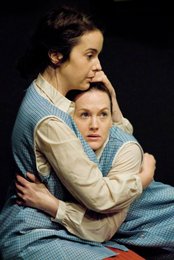There are no bad women in Ireland, only fresh virgins and married mothers. That was the dominant narrative of twentieth-century Ireland, agreed by Church and State and complied with by family and community. For those fallen women, witches, deviants and the mentally ill, high walls and stolen decades became their story.
Idir Mná, a company dedicated to addressing the lack of meaty female roles in theatre, puts solid effort into telling this story, produced in support of Justice for Magdalenes, a group campaigning for state acknowledgement and redress of Magdalene history in Ireland. Centred on characters Persephone (Crissy O’Donovan) and Dora (Kathryn O’Hart), they adopt alter-egos Porph and Dorph for the enactment of their fantasies to survive the silence of incarceration. Playwright Charlotte Jones dramatizes the fate of a Miss Kitson and Miss Baker, two inmates that ‘did time’ for pregnancy outside of wedlock: five decades in St Dymphna’s hospital for the criminally insane.
 Determined performances by O’Donovan and O’Hart convey the potential of these characters, and hint at the complexity of a relationship that can survive a lifetime of oppression and torture. They meet as strangers but form various bonds and play a range of roles in their caged lives, both for survival and stimulation. From parent to child, war colonel to soldier and Doris Day to Joan of Arc, the hierarchies, histories and traditional gender roles they enact remind us that regardless of the limits of social space and freedom, all societies operate on structures of organization, even when the population is limited to two.
Determined performances by O’Donovan and O’Hart convey the potential of these characters, and hint at the complexity of a relationship that can survive a lifetime of oppression and torture. They meet as strangers but form various bonds and play a range of roles in their caged lives, both for survival and stimulation. From parent to child, war colonel to soldier and Doris Day to Joan of Arc, the hierarchies, histories and traditional gender roles they enact remind us that regardless of the limits of social space and freedom, all societies operate on structures of organization, even when the population is limited to two.
However, a lack of dramatic rhythm dominates the play overall. The braveness of the story is not matched by a confident play; instead of taking the audience on a journey of depth and vision, the fragmentary scenes prevent the development of narrative tension. Directed by Yvonne Ussher, the constant quick shifts from the women’s dramatic reality to the enactment of their fantasies disrupt any chance to really unpack the action and let the story begin to tell itself. The dialogue does deliver moments of comedy and tragedy but ultimately both script and direction over-tell every message, lacking subtlety, dimension and denying the audience a chance to ponder the nuances of this story as all the answers are overtly provided.
Krugel’s set design intends to merge the drudgery of the women’s dramatic reality, bath-cleaning mostly, with the excitement of their dramatic fantasies: stardom and war heroes. However, the box-like fixtures on the wall holding books, baking equipment and toys do not seem to significantly enter either the naturalistic design or signal symbolic meaning. Planks of wood board up the walls and doorways and again, overstate the message. The lighting design appears motivated more by function than aesthetics, covering the constant scene changes but not necessarily deepening the theatrical milieu.
.jpg.aspx%3Fwidth=260&height=173) Nevertheless, the production successfully presents a female body that resonates with Roman Catholic and Irish Nationalist agendas. The characters’ costumes covered danger areas such as the neck, collarbone, arms and most of the legs. Matching shapeless garments both confirmed their status as unpaid workers and stamped out any visual erotic pleasure of the body. A female body must be a powerful thing indeed if it can fill institutions nationwide for the management of proper society; estimated at 33,000 female bodies throughout the twentieth century. Women delivered to these ‘refuges’ may have given birth outside of wedlock, been considered mentally ill, or possibly, were deemed too beautiful and thus may encounter ‘occasion to sin’. Airswimming confirms Porph and Dorph will not meet another occasion to sin.
Nevertheless, the production successfully presents a female body that resonates with Roman Catholic and Irish Nationalist agendas. The characters’ costumes covered danger areas such as the neck, collarbone, arms and most of the legs. Matching shapeless garments both confirmed their status as unpaid workers and stamped out any visual erotic pleasure of the body. A female body must be a powerful thing indeed if it can fill institutions nationwide for the management of proper society; estimated at 33,000 female bodies throughout the twentieth century. Women delivered to these ‘refuges’ may have given birth outside of wedlock, been considered mentally ill, or possibly, were deemed too beautiful and thus may encounter ‘occasion to sin’. Airswimming confirms Porph and Dorph will not meet another occasion to sin.
While script, direction and design did not pack a punch as powerful as it potentially could have, by staging Airswimming Idir Mná has entered a national and international discourse concerning the Magdalene Laundries and Ireland’s relationship with notions of womanhood. Irish drama is engaging full throttle with this conversation; while Airswimming brings incarceration into the theatre, only a few miles north, Anu Productions brings the theatre into the former Gloucester St. Magdalene Laundry with their site-specific Laundry. The high walls and stolen decades are being revisited. Taken together, these plays highlight two dominant injustices; firstly, that such horrors took place and secondly, that they have only entered the national conversation in recent decades.
Miriam Haughton is Course Director of the Irish Literature Program at Public Affairs Ireland and a PhD Candidate at UCD, where she also teaches.